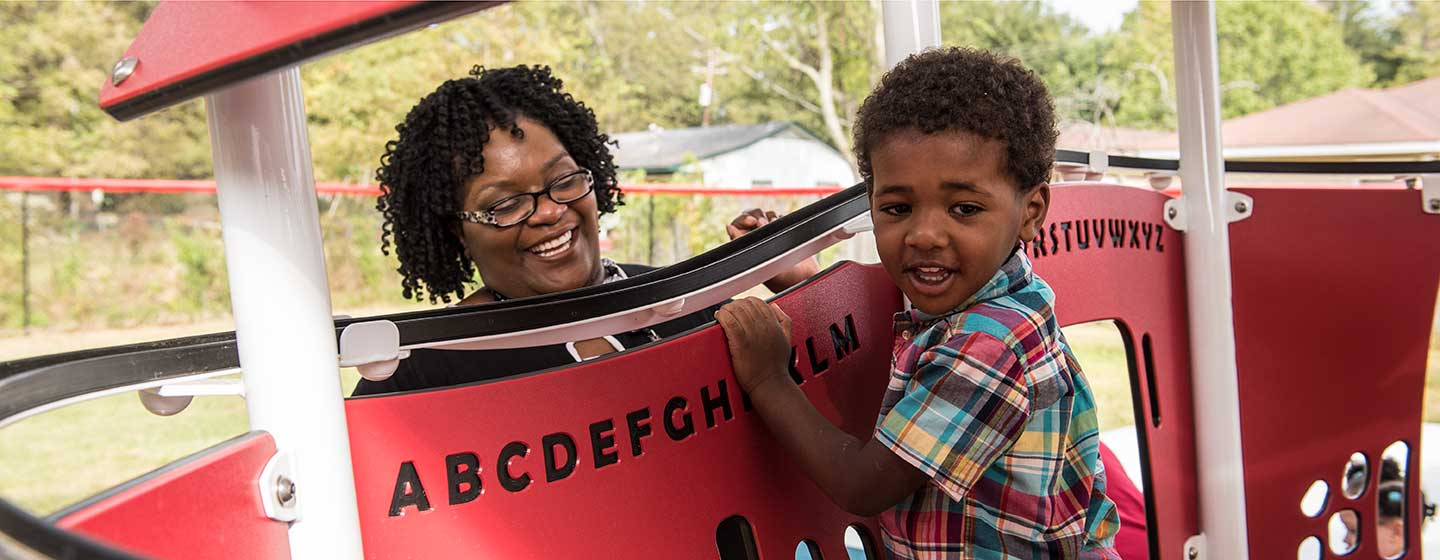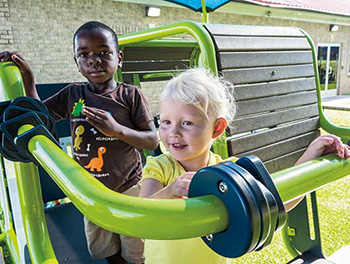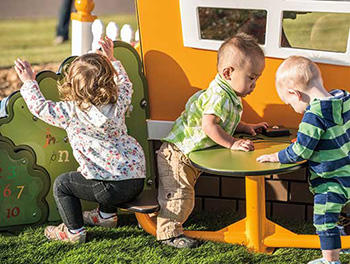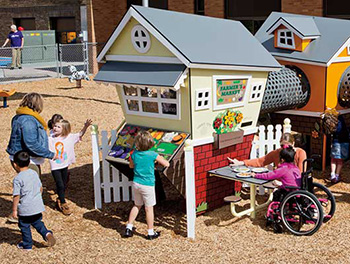Early Childhood Development & the Benefits of Play

Developing Strong Bodies and Minds
Play in early childhood is not only fun for children, it helps them develop important life skills, habits and attitudes. As children play, they learn persistence, patience, empathy and leadership skills.
When play is emphasized in early childhood, it lays a foundation for important skills that shape the adults they will become. The developmental benefits of play are so strong the UN High Commission on Human Rights declared play a fundamental right of all children.
The Role of Playgrounds in Early Childhood Development
 Playgrounds do more for early childhood development than many realize. Not only do playgrounds offer the obvious physical benefits to kids becoming heathier and stronger, but they also provide the context and opportunity for children to practice key developmental and social skills.
Playgrounds do more for early childhood development than many realize. Not only do playgrounds offer the obvious physical benefits to kids becoming heathier and stronger, but they also provide the context and opportunity for children to practice key developmental and social skills.
Various studies highlighted in our whitepaper "Shaped by Play: The Formative Role of Play and Playgrounds" show children spend around 80 percent of their time on playgrounds engaging in social, physical, and pretend play. The studies further show that these types of play can be reinforced by certain playground features, including:
- Varied equipment, such as climbers and play elements with motion, lends itself to diverse activities and skill levels.
- Partly-enclosed spaces like crawl tunnels and our Cozy Dome provide an opportunity for children to self-regulate emotions and rejoin play when ready.
- Open-ended type of play like rope climbers and store-front type panels encourage imaginative play and to creatively explore in unexpected ways.
Well-designed playgrounds offer something for children of all needs and levels of ability. Toddlers who are learning to walk can find a physical challenge in climbing a few stairs, while skillful 4-year-olds can find an equally exciting challenge with a climbing arch. Open spaces offer the opportunity to engage in pretend scenarios, and a quiet nook can facilitate the private creation of elaborate stories.
Playgrounds for toddlers and preschoolers can encourage skill development by keeping this in mind
- Interaction – interactive playground features allow kids to get firsthand experience of the principle of cause-and-effect. Additionally, literacy panels developed in partnership with Too Small to Fail's "Talking is Teaching: Talk, Read, Sing" Campaign will help encourage conversations among caregivers and children.
- Sensory – playground designs and equipment should provide children with a wealth of different tactile experiences, which can come from play with textured surfaces and by incorporating natural materials like wood chips, sand and water.
- Challenge – play environments with developmentally-appropriate challenges and puzzle-like features can help instill critical thinking and problem-solving skills.
- Imagination – children should be able to use various components of the playground to express their creativity and invent imaginative scenarios.
- Independence – playground structures should allow kids to feel independent through solo explorative play, which fosters confidence and creativity without sacrificing safety.
Check out our many options of early childhood play equipment and get started planning your new playground.
Best Playgrounds for Preschool Children
 Several studies have shown that children's play provides a context for practicing key developmental skills. Taking it one step further, we commissioned an observational study to examine the patterns of play on a playground and assess how particular play spaces and equipment might encourage the development of each skill.
Several studies have shown that children's play provides a context for practicing key developmental skills. Taking it one step further, we commissioned an observational study to examine the patterns of play on a playground and assess how particular play spaces and equipment might encourage the development of each skill.
We observed that young children develop problem solving skills as they navigate a piece of playground equipment that is new to them. Persistence and conquering a fear was also observed when a child was initially too scared to try out a portion of the play space. Then after working to master something difficult, they felt a huge sense of pride in their accomplishment.
To learn more about which play areas were observed as the most popular and beneficial for children ages 2-5, download our whitepaper, "Shaped by Play: How Play Types Impact Development."
Inclusive Playgrounds for All
 We design our early childhood playgrounds to encourage and support the development of healthy kids, while welcoming kids of all abilities. Children need to play, learn and grow together, side by side, but accessibility is not enough. Simply getting a child with limited mobility onto the playground doesn't necessarily enhance their play experience. Nor does it take into consideration children with sensory deficits and other developmental challenges.
We design our early childhood playgrounds to encourage and support the development of healthy kids, while welcoming kids of all abilities. Children need to play, learn and grow together, side by side, but accessibility is not enough. Simply getting a child with limited mobility onto the playground doesn't necessarily enhance their play experience. Nor does it take into consideration children with sensory deficits and other developmental challenges.
We focus on five specific areas of skill development – sensory, motor, cognitive, strength and social/emotional. Multisensory experiences, for example, are beneficial because using more than one sense at a time helps to build the brain more quickly.
All kids benefit from exploring these areas of developmental skills when at play, however, kids with disabilities may need to break that information into smaller parts. Some may require additional sensory input, others do better with less. Some may prefer to experience this input more frequently, others less frequently.
That's why it is so important for playgrounds—especially inclusive playgrounds—to provide a variety of developmental options for kids to choose from. We can help ensure that your playground exceeds ADA guidelines and includes a multitude of activities to accommodate a range of developmental needs.
Learn more about our inclusive playground options and our commitment to inclusive play.